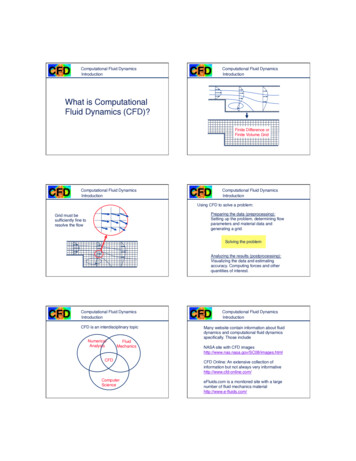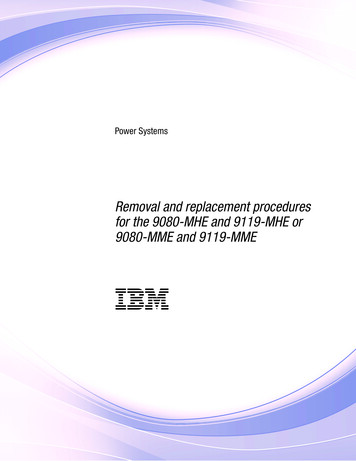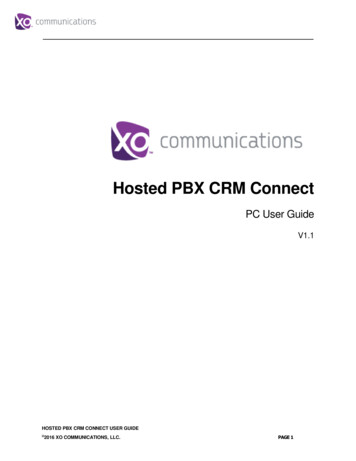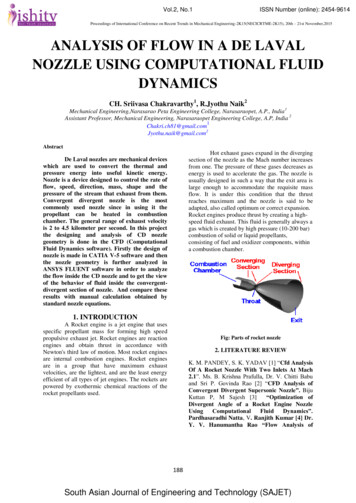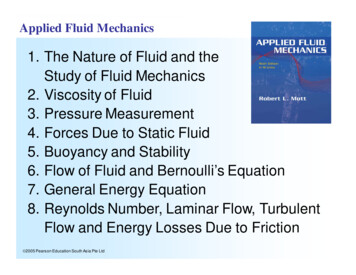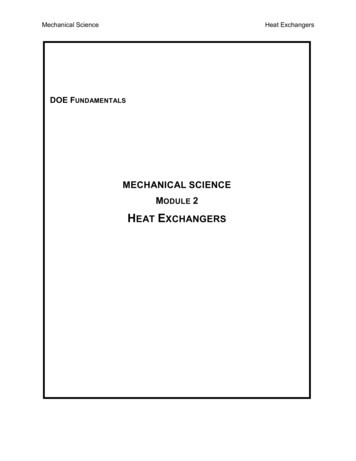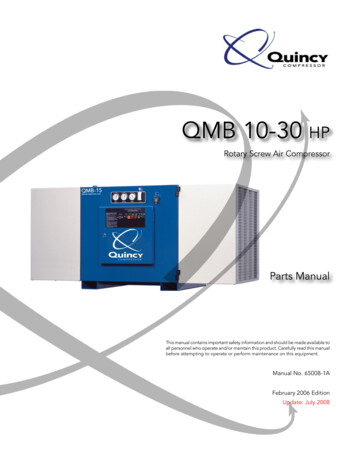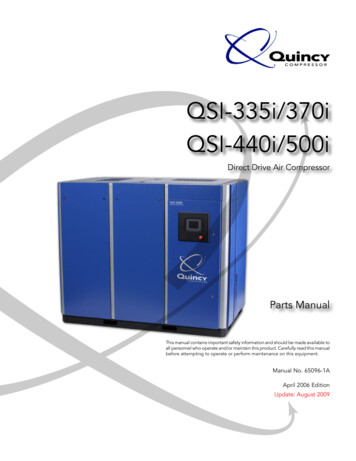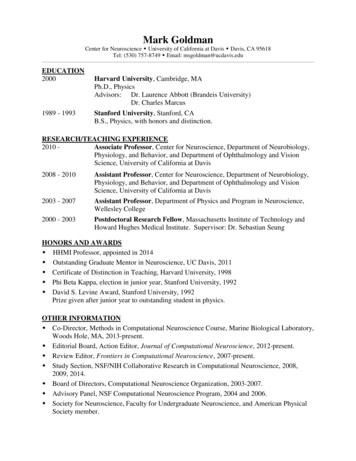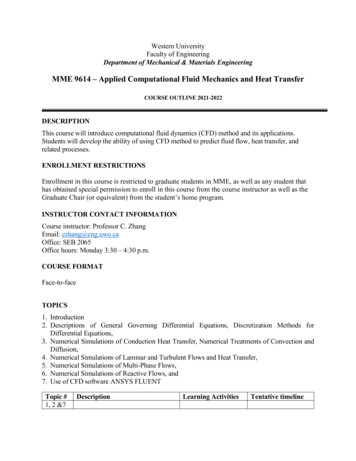
Transcription
Western UniversityFaculty of EngineeringDepartment of Mechanical & Materials EngineeringMME 9614 – Applied Computational Fluid Mechanics and Heat TransferCOURSE OUTLINE 2021-2022DESCRIPTIONThis course will introduce computational fluid dynamics (CFD) method and its applications.Students will develop the ability of using CFD method to predict fluid flow, heat transfer, andrelated processes.ENROLLMENT RESTRICTIONSEnrollment in this course is restricted to graduate students in MME, as well as any student thathas obtained special permission to enroll in this course from the course instructor as well as theGraduate Chair (or equivalent) from the student’s home program.INSTRUCTOR CONTACT INFORMATIONCourse instructor: Professor C. ZhangEmail: czhang@eng.uwo.caOffice: SEB 2065Office hours: Monday 3:30 – 4:30 p.m.COURSE FORMATFace-to-faceTOPICS1. Introduction2. Descriptions of General Governing Differential Equations, Discretization Methods forDifferential Equations,3. Numerical Simulations of Conduction Heat Transfer, Numerical Treatments of Convection andDiffusion,4. Numerical Simulations of Laminar and Turbulent Flows and Heat Transfer,5. Numerical Simulations of Multi-Phase Flows,6. Numerical Simulations of Reactive Flows, and7. Use of CFD software ANSYS FLUENTTopic #1, 2 &7DescriptionLearning ActivitiesTentative timeline
Lesson 1: Introduction &Descriptions of General GoverningDifferential EquationsLesson 2: Discretization Methodsfor Differential EquationsLab 1: How to use ICEMCFD tocreate mesh3&74&75&7 Lesson 3: Numerical Simulations ofConduction Heat TransferLab 2: How to simulate 2Dconduction heat transfer Lesson 4: Numerical Treatments ofConvection and DiffusionLab 3: How to create 2D mesh for amore complicated geometry Lesson 5: Simulations of Laminarand Turbulent Flows and HeatTransferLab 4: How to simulate pipe flowswith heat transfer Lesson 6: Numerical Simulations ofMulti-Phase Flows – Dilute FlowsLab 5: How to generate tetra/mixedmesh for a 3D geometry Lesson 7: Numerical Simulations ofMulti-Phase Flows – Dense FlowsLab 6: How to simulate dilute gassolid two-phase flows6&7 Lesson 8: Numerical Simulations ofReactive FlowsLab 7: How to simulate dense gassolid two-phase flows LecturesAdditionalreading materialsLecturesAdditionalreading materialsLab/tutorialsessionAssignment #1Week 1LecturesAdditionalreading ing materialsLab/tutorialsessionAssignment #2Week 3LecturesAdditionalreading materialsLab/tutorialsessionWeek 5LecturesAdditionalreading materialsLab/tutorialsessionAssignment #3LecturesAdditionalreading materialsLab/tutorialsessionWeeks 6LecturesAdditionalreading materialsWeek 8Weeks 2Week 4Week 7
CFD ApplicationsLab 8: How to simulate nonpremixed combustion Guest Speakers Course Project PresentationsLab/tutorialsessionAssignment #4LecturesAdditionalreading materialsLab/tutorialsessionGuest lecturesLab/tutorialsessionAssignment #5Week 9Week 10Weeks 13SPECIFC LEARNING OUTCOMESDegree LevelExpectationWeightDepth and breadthof knowledge60% Assignments Understanding of advanced concepts andtheories Awareness of important current problemsin the field of study Understanding of computational and/orempirical methodologies to solve relatedproblems Ability to use a CFD software to conductCFD simulations for different types offluid flow and heat transfer systemsResearch &scholarship25% Project Report Ability to conduct critical evaluation ofcurrent advancements in the field ofspecialization Ability to conduct coherent and thoroughanalyses of complex problems usingestablished techniques/principles andjudgmentCommunicationskills15% ProjectPresentation Ability to communicate (oral and/orwritten) ideas, issues, results andconclusions clearly and effectivelyASSESSMENTSAssessment ToolsOutcomes
Assessment TypeHomework Assignments (five)Assignment #1Assignment #2Assignment #3Assignment #4Assignment #5Project PresentationProject ReportMaterial CoveredTopics 1-3, 7Topics 4, 7Topics 5, 7Topics 5, 7Topics 6, 7Tentative DueDateWeek 4Week 6Week 8Week 10Week 12Week 13Week 14Weight12%12%12%12%12%15%25%Activities in which collaboration is permitted: NoneActivities in which students must work alone (collaboration is not permitted): Assignments and course project.COMPUTINGCommercial software ANSYS FLUENTCFD LABSStudents will learn how to use ANSYS FLUENT to carry out CFD simulations for different typesof fluid flow and heat transfer problems during the CFD lab sessions.TEXTBOOK(S)Numerical Heat Transfer and Fluid Flow, S.V. Patankar, Hemisphere Publishing Co., New York,1980.OPTIONAL COURSE READINGSComputational Fluid Dynamics, John Anderson, McGraw-Hill, New York, 1995.An Introduction to Computational Fluid Dynamics: The Finite Volume Method, H. Versteeg and W.Malalasekera, Pearson, London, UK, 2007.CHEATING, PLAGIARISM/ACADEMIC OFFENCESAcademic integrity is an essential component of learning activities. Students must have a clearunderstanding of the course activities in which they are expected to work alone (and what workingalone implies) and the activities in which they can collaborate or seek help; see information aboveand ask instructor for clarification if needed. Any unauthorized forms of help-seeking orcollaboration will be considered an academic offense. University policy states that cheating is anacademic offence. If you are caught cheating, there will be no second warning. Students must write
their essays and assignments in their own words. Whenever students take an idea or a passage oftext from another author, they must acknowledge their debt both by using quotation marks whereappropriate and by proper referencing such as footnotes or citations. Plagiarism is a major academicoffence. Academic offences are taken seriously and attended by academic penalties which mayinclude expulsion from the program. Students are directed to read the appropriate policy,specifically, the definition of what constitutes a Scholastic Offence at the following website:https://www.uwo.ca/univsec/pdf/academic policies/appeals/scholastic discipline grad.pdfAll required papers may be subject to submission for textual similarity review to the commercialplagiarism-detection software under license to the University for the detection of plagiarism. Allpapers submitted for such checking will be included as source documents in the reference databasefor the purpose of detecting plagiarism of papers subsequently submitted to the system. Use of theservice is subject to the licensing agreement, currently between The University of Western Ontarioand Turnitin.com (http://www.turnitin.com).CONDUCTStudents are expected to follow proper etiquette to maintain an appropriate and respectful academicenvironment. Any student who, in the opinion of the instructor, is not appropriately participating incourse activities and/or is not following the rules and responsibilities associated with the courseactivities, will be reported to the Associate Dean (Graduate) (after due warning has been given). Onthe recommendation of the Department concerned, and with the permission of the Associate Dean(Graduate), the student could be debarred from completing the assessment activities in the course asappropriate.HEALTH/WELLNESSAs part of a successful graduate student experience at Western, we encourage students to maketheir health and wellness a priority. Western provides several health and wellness related servicesto help you achieve optimum health and engage in healthy living while pursuing your graduatedegree. Information regarding health- and wellness-related services available to students may befound at http://www.health.uwo.ca/.Students seeking help regarding mental health concerns are advised to speak to someone they feelcomfortable confiding in, such as their faculty supervisor, their program director (graduate chair),or other relevant administrators in their unit. Faculty of Engineering has a Student WellnessCounsellor. To schedule an appointment with the counsellor, contact Kristen Edwards(khunt29@uwo.ca) via confidential email and you will be contacted by our intake office within 48hours to schedule an appointment.Students who are in emotional/mental distress should refer to Mental th/ for a complete list of options about how to obtain help.SICKNESSStudents should immediately consult with the Instructor (for a particular course) or Associate Chair(Graduate) (for a range of courses) if they have problems that could affect their performance. Thestudent should seek advice from the Instructor or Associate Chair (Graduate) regarding how best todeal with the problem. Failure to notify the Instructor or the Associate Chair (Graduate) immediately
(or as soon as possible thereafter) will have a negative effect on any appeal. Obtaining appropriatedocumentation (e.g., a note from the doctor) is valuable when asking for accommodation due toillness.Students who are not able to meet certain academic responsibilities due to medical, compassionateor other legitimate reason(s), could request for academic consideration. The Graduate AcademicAccommodation Policy and Procedure details are available ESSIBLE EDUCATION WESTERN (AEW)Western is committed to achieving barrier-free accessibility for all its members, including graduatestudents. As part of this commitment, Western provides a variety of services devoted to promoting,advocating, and accommodating persons with disabilities in their respective graduate program.Graduate students with disabilities (for example, chronic illnesses, mental health conditions,mobility impairments) are strongly encouraged to register with Accessible Education Western(AEW): http://academicsupport.uwo.ca/accessible education/index.htmlAEW is a confidential service designed to support graduate and undergraduate students through theiracademic program. With the appropriate documentation, the student will work with both AEW andtheir graduate programs (normally their Graduate Chair and/or Course instructor) to ensure thatappropriate academic accommodations to program requirements are arranged. Theseaccommodations include individual counselling, alternative formatted literature, accessible campustransportation, learning strategy instruction, writing exams and assistive technology instruction.
This course will introduce computational fluid dynamics (CFD) method and its applications. Students will develop the ability of using CFD method to predict fluid flow, heat transfer, and related processes. ENROLLMENT RESTRICTIONS . Enrollment in this course is restricted to graduate students in MME, as well as any student that
